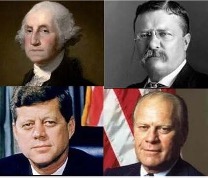Widgetized Section
Go to Admin » Appearance » Widgets » and move Gabfire Widget: Social into that MastheadOverlay zone
Will We Become Something Else?
The views expressed are those of the author and do not necessarily reflect the views of ASPA as an organization.
By Anna Marie Schuh
March 3, 2025

I have written this quarterly column for ten years; however, this article has been the most difficult to write. In the past, my focus was on good civil service management practices that provide good service to the public. Sometimes I have stressed the historical context and other times I have highlighted human resource practices. However, during the ten years, it never occurred to me that one day I would be writing a column when good management practices, compliance with public law and concern about quality service were no longer aspirations of leadership. So, in this column, I want to reflect on what previous presidents thought about the law and public service
George Washington did not envision how the world and our fledgling democracy would change. However, Washington knew human nature and he was concerned that democracy was fragile and it might not prevail. So, he highlighted the importance of compliance with law in his farewell address when he noted: “Respect for … [government] authority, compliance with its laws, acquiescence in its measures, are duties enjoined by the fundamental maxims of true liberty…All obstructions to the execution of the laws, all combinations and associations … with the real design to direct, control, counteract, or awe the regular deliberation and action of the constituted authorities, are destructive of this fundamental principle …”
Washington saw public deliberation as the only way to maintain the United States as a democracy and he understood that self-interest was a primary danger. Because of that perspective, his selection criteria for federal employment was merit and he rejected the British Empire government employment approach involving “who you knew.” Washington’s version of merit was followed until Andrew Jackson introduced “job rotation” to avoid providing workers a permanent right to their positions. Under this principle, Jackson removed officials and replaced them with loyal partisans. Jackson’s approach continued until after the civil war when the inefficiencies of the system resulted in calls for change.
The 1883 Pendleton Act that created the Civil Service Commission (CSC) was that change. Theodore Roosevelt was an early CSC Commissioner, serving from 1889 to 1895. Roosevelt noted that “The object of government is the welfare of the people.” He pointed out that “Good legislation does not secure good government, which can come only through a good administration.” He added that the bulk of government is not legislation but administration.
His view was that “Good government does not come by any special genius or brilliancy. Good government comes from the average man showing the qualities which we recognize as making a good friend and good neighbor.” He added “We must have clean and decent government; we must have good laws; we must have decent officials to make and to execute the laws.“ As civil service commissioner, he enforced the merit system because of his concerns about effective and efficient government administration that would provide for the welfare of the people.
As government became more complex, John Kennedy worried that a growing anti-government sentiment could derail the country’s progress. He observed that “… a growing disdain for public service in our Nation …has been coupled with a trend for increasing complexity of national problems. We must secure the services of the best minds of our Nation—and expand the horizons of those career servants who have demonstrated their distinction—if we are to cope with the staggering burdens of discouraging and puzzling problems that now confront us.”
In his inaugural address after becoming president because of Richard Nixon’s resignation, Gerald Ford stated that “Thomas Jefferson said the people are the only sure reliance for the preservation of our liberty. And down the years, Abraham Lincoln renewed this American article of faith asking, ‘Is there any better way or equal hope in the world?’” Later in the speech Ford added “Our Constitution works; our great Republic is a government of laws and not of men. Here the people rule. “
In his proclamation for public service week, Barack Obama emphasized that ”…With 85 percent of Federal Government jobs located outside of the Washington, D.C. area, our Federal workers, together with leaders and advocates from State and local levels, play key roles in ensuring the voices of the American people are heard. And even in the toughest of circumstances, including a politics that does not always fully recognize the value of their work, our public servants—often at great personal sacrifice—continue striving to build a better country and to bring lasting change to the lives of ordinary people across America.”
As the above quotations emphasize, following the rule of law created through representative deliberation, together with an American civil service only obligated to the Constitution, has been the standard until now. On those occasions when top leadership strayed from the norms, citizens still supported those norms, and the country returned to those standards. Now we find ourselves in perilous times with leadership that disparages and violates those values leaving the future unpredictable. Can we return to those norms that made us who we are, or will we become something else?
Author: Anna Marie Schuh is Associate Professor and MPA Program Director at Roosevelt University, Chicago where she teaches political science and public administration. She retired from federal service after 36 years. Her last assignment involved management of the Office of Personnel Management national oversight program. She is a member of the Chicago ASPA Chapter Executive Committee. Email: [email protected]; BlueSky:


Follow Us!